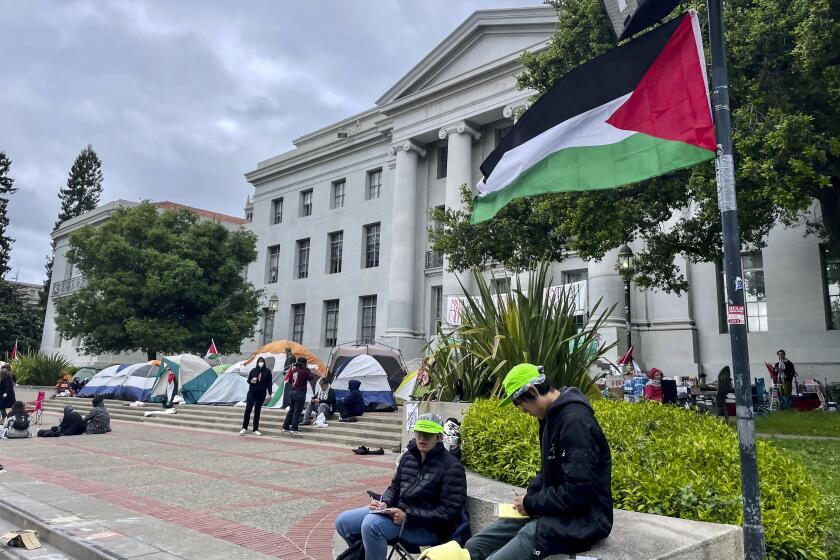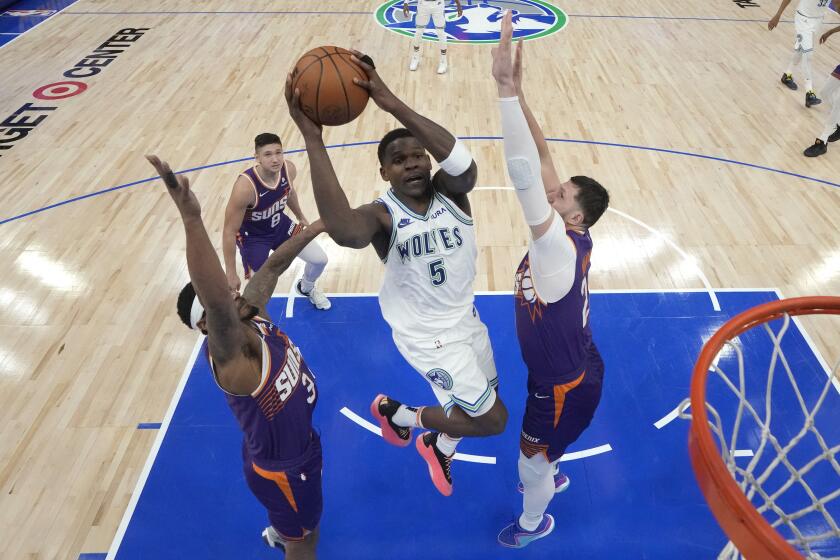‘He didn’t succeed’: San Diego’s Muslims embraced after New Zealand mosque massacres

Last week, office administrator Maryam Abdullah had to negotiate an obstacle course to reach her desk in the Islamic Center of San Diego.
She edged past roses, carnations and wildflowers piled across counters. Stepped around more bouquets stacked on the floor. Resisted candy and cookies left by non-Muslim visitors. Avoided knocking over greeting cards and a homemade poster, the latter reading “You Are Us.”
To Abdullah, these gestures sent a message: “He didn’t succeed.”
“He” was the terrorist who killed 50 Muslims in two New Zealand mosques on March 15. The slaughter of men, women and children at prayer struck a chilling chord around the world, frightening Muslims — and others — who have seen too many mass murders in the name of various warped causes.
Police reported that the perpetrator of this atrocity had issued a manifesto, urging a white nationalist campaign against immigrants and religious minorities. If his goal was to provoke more outbursts of anti-Muslim violence, he failed.
Spectacularly.
“We have had an overwhelming outpouring of love, support, sympathy and solidarity from all walks of life,” said Imam Taha Hassane, the Islamic Center’s spiritual leader. “We are seeing people who have never been in a mosque in their lives walking in with flowers and words of love and support.”
That support was especially strong among faith leaders — including local rabbis. They recalled that Hassane and other Muslims had rallied to their side last October, after 11 Jews were murdered in a Pittsburgh synagogue.
“This was important to me,” Rabbi Michael Berk of Beth Israel said about joining a delegation of rabbis to the Islamic Center the day after the New Zealand atrocity. “Just as love and support was shown to our community, we would show that in return.”
“Imam Taha and other imams are our beloved neighbors,” said Rabbi Lauri Coskey, head of Chavurah Kol Haneshamah, a community that gathers for Jewish holy days and life celebrations. “We know each other and we show up for each other.”
‘Like a tsunami’
While San Diego has always been home to Muslims, Muslims haven’t always been a visible thread in our civic fabric. That was especially true after 9/11, when many kept a low profile for fear of a backlash from non-Muslims.
“I remember the same deep, raw pain that everybody felt,” said Ismahan Abdullahi, the Muslim American Society’s national deputy director, recalling her reaction to that terrorist attack. “But I felt demonized by what seemed like a majority of American citizens. Back then, I felt I could only rely on my own Muslim community and a few allies.”
Even before 9/11, foreign politics often prevented better domestic relationships. Tensions between Israel, an ally of the U.S., and Iran, Syria and other Arab nations hindered attempts to build bridges between local Muslims and their Christian and Jewish neighbors.
Hassane, an immigrant from Algeria, arrived at the San Diego center 14 years ago. His early efforts to reach out to the broader community were resisted — by his own congregation.
“Why are you having these programs with Jews and Christians?” he was asked.
Some Jews and Christians asked the same question. Did Muslims belong in “interfaith” gatherings?
“In the ’80s and ’90s, if we had an interfaith gathering it didn’t include Muslims,” Rabbi Berk said. “There was the National Conference of Christians and Jews — now they call themselves ‘the National Conference,’ but ‘interfaith’ initially was just Christians and Jews.”
Hassane persisted. Few were surprised when the imam joined other clerics in protesting the U.S. occupation of Iraq, but Hassane’s concerns extended beyond the Middle East. He insisted on addressing a larger audience, beyond the walls of his mosque.
“Imam Taha has spoken at my church and churches all across San Diego,” said the Rev. Beth Johnson, pastor of the Palomar Unitarian Universalist Fellowship in Vista.
“There is such a strong connection with the Muslim community and that is very much due to the outreach and ongoing presence of Imam Taha Hassane.”
When local spiritual leaders marched for immigration reform or better working conditions, Hassane would be in the front ranks. He condemned terrorism, no matter the ethnic or religious identity of the attacker or the victims.
“He is a criminal and should be taken to justice,” Hassane said, citing the self-professed Muslim mastermind of the 2015 San Bernardino massacre. “That’s it.”
Then came last Oct. 27. When a gunman slaughtered 11 Jews inside Pittsburgh’s Tree of Life synagogue, social media spread the news — and the sense of shock and fear — within minutes.
“When Pittsburgh happened,” Rabbi Berk said, “it sort of swept over the Jewish community like a tsunami. One of the first personal outreaches we had was from Imam Taha. His love and support was so important.”
A few days later, Beth Israel held a vigil. It was attended by thousands of people, representing numerous backgrounds and religions.
“The most moving thing was when all the faith leaders were asked to come to the pulpit,” Berk said. “There were 40 — I was just overwhelmed. And, of course, among them was Imam Taha.”
“I had to go,” Hassane said. “This is what my faith tells me. If my neighbor is in pain, I am in pain.”
This month, clerics and lay people from all religions — and non-religions; local atheists were also present — flocked to the Islamic Center, expressing solidarity and concern. For Hassane and his flock, it was a watershed moment.
“The same ones who were asking why we were having programs with Jews and Christians,” the imam said, “those same people now see the importance of this interfaith work.”
Sad ties that bind
Religious scholars teach that Muslims, Jews and Christians belong to the same spiritual family, worshipers of one almighty God whose respective faiths share many tenets. Despite stereotypes of deep hostility between Muslims and Jews, polls show that they look on each other with a great deal of admiration.
In 2018, the Pew Research Center surveyed Muslims in several countries, asking if they had an unfavorable view of Jews. In the U.S., only 7 percent answered “yes.”
This year, the Michigan-based Institute for Social Policy and Understanding conducted a similar survey. This one found that only 10 percent of U.S. Muslims had an unfavorable view of Jews, while 13 percent of U.S. Jews expressed unfavorable views of Muslims.
Positive views of Jews were held by 45 percent of Muslims, and 53 percent of Jews had positive views of Muslims.
“Tensions are over-played,” said the Muslim American Society’s Abdullahi.
While American Muslims and Jews tend to be divided over Israeli-Palestinian relations and other Middle Eastern issues, they’ve found common cause in opposing terror.
“It was so beautiful to see this solidarity,” Abdullahi said, referring to the thousands who rallied at a vigil in Balboa Park last Sunday.
“We stood together when the shootings happened in Pittsburgh, so we are going to stand together against this Islamophobia as well. The root issue is white supremacy and that doesn’t impact just the Islamic community. It affects us all.”
The bridge-building continues. On Wednesday, Hassane was an invited guest at St. Paul’s, the Episcopalian cathedral on Banker’s Hill. There, he led Muslims and non-Muslims in the traditional Islamic prayers at sunset.
On that same evening, a candlelight vigil at the University of San Diego — a Catholic institution — remembered the Muslims killed in New Zealand.
“We’ve had a lot of support from our school,” said Rameen Javadian, the international relations undergraduate and Muslim Students Association president who organized the event. “Especially the university ministry and the dean.”
Among those assured Javadian they’d take part in the vigil: leaders of the school’s Jewish Student Union.
That may be surprising, but should it be? Tammy Gillies, executive director of the Anti-Defamation League’s San Diego branch, has her doubts.
“Taha and I both agree there are areas we don’t agree, but we are setting those aside,” said Gillies, whose nonprofit is rooted in the Jewish community. “Right here, in this community, we are leaders and we need to make our community better.”
Lethal attacks in a house of worship, Gillies added, “is, sadly, something that binds us. As Americans, we have to say this is what we don’t want.”
Two Fridays ago, she demonstrated what we do want: cookies.
She brought those goodies to the Islamic Center, telling the imam she wanted to cheer up the congregation’s children. Gillies shared her grief and anger with Hassane. And then this Jewish woman walked upstairs to join her Muslim neighbors in midday prayer.
Suscríbase al Kiosco Digital
Encuentre noticias sobre su comunidad, entretenimiento, eventos locales y todo lo que desea saber del mundo del deporte y de sus equipos preferidos.
Ocasionalmente, puede recibir contenido promocional del Los Angeles Times en Español.




